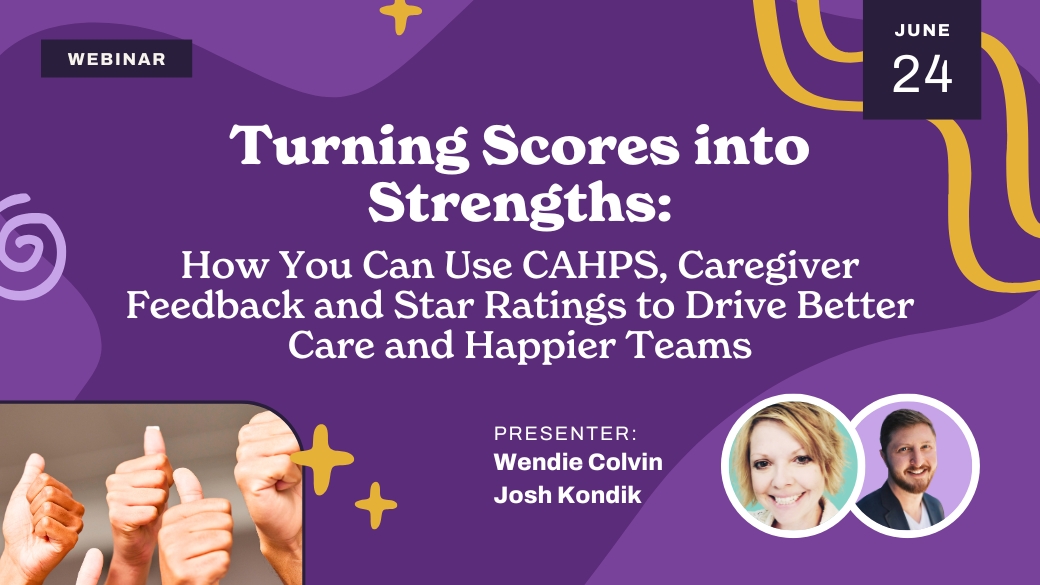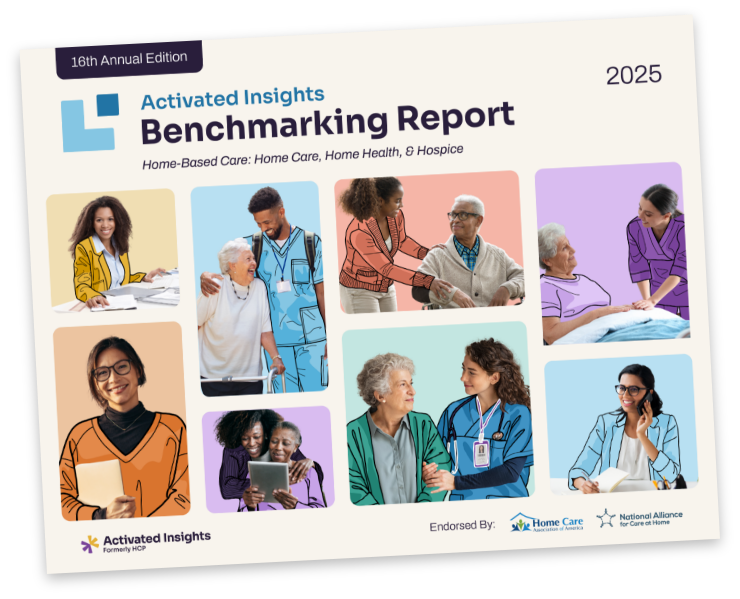Digital advertising is an essential tool for today’s care marketers, and achieving sustained success requires a data-driven approach. While the prospect of diving into data may seem daunting, the following is essential for refining and maximizing advertising strategies.
Note: This article was originally published in the 2024 Activated Insights Benchmarking Report.
Digital advertising is an essential tool for today’s care marketers, and achieving sustained success requires a data-driven approach.
According to a McKinsey & Company survey, data-driven companies are:
23 times more likely to outperform competitors in customer acquisition
19 times more likely to have above-average profits
2.6 times more likely to see a higher ROI
Leveraging consumer-driven data points is vital for care companies seeking to optimize the return on their digital advertising investment (ROI).
“While the prospect of diving into data may seem daunting, it is essential for refining and maximizing advertising strategies.”
Understanding the Strategic Importance of Data
Care marketers must understand that digital advertising success is not achieved through implementation alone. Instead, success can only be achieved through continuous refinement of digital advertising efforts using data insights. For care companies, embracing the strategic significance of data is paramount to growth. While the prospect of diving into data may seem daunting, it is essential for refining and maximizing advertising strategies.
Understanding consumer behavior is the cornerstone of effective digital marketing, and this knowledge is best gleaned from analyzing data. Attention to reviews and satisfaction feedback offers invaluable guidance on customer expectations. Additionally, delving into digital advertising analytics reveals crucial details such as campaign performance, engagement metrics, and the impact of specific marketing initiatives on conversions.
Furthermore, keeping a pulse on competitor advertising provides valuable benchmarks and inspiration for refining strategies. By harnessing consumer insights and advertising performance metrics, care companies can craft targeted campaigns that resonate deeply with their audience segments, driving higher engagement and conversions.
Researching and Understanding Care Consumer Behavior
To reach your target audience (and achieve desired results), you must first understand who they are and how they act as consumers. Consumer research allows care companies to identify care consumer preferences, pain points, and trends within the industry. This research is the basis for crafting compelling advertising messages that resonate with the audience.
A good jumping-off point for consumer research is Google Reviews. Eighty-one percent of consumers use Google to evaluate local businesses, and 93% of online users say online reviews impact their buying decisions. Online reviews offer valuable insights from real customers which reveal preferences and pain points to address in digital advertising campaigns.
Look at your own agency’s online reviews. Then, take it a step further and use a satisfaction survey company like Activated Insights for deeper insights into clients’ and employees’ thoughts about your company. What are current and former clients saying about your services? Do you notice recurring themes, such as clients needing caregivers in areas you don’t currently service, more round-the-clock care, etc.?
Also, look at competitors’ reviews to gauge any trending problems that your agency might be able to solve for unhappy clients or if there are ways you can improve to meet consumers’ needs in your market area better.
Monitoring Key Data Points
The sheer amount of data available to you can feel overwhelming. However, to gauge the success of digital advertising efforts and increase return on ad spend (ROAS), care companies must also monitor and measure various vital data points. The following are some crucial metrics for care companies to focus on:
Google Ads:
- Google Pay-Per-Click (PPC) Advertising: Analyzing the performance of PPC campaigns provides valuable insights into the effectiveness of your paid advertising efforts. Agencies should keep a close eye on the following metrics:
- Click-through rates
- Cost per conversion
- Cost per click
- Lead attribution
- Overall ROAS
Search Engine Optimization (SEO):
- Organic Search Visibility: While paid ads are an important aspect of marketing, improving organic search rankings is essential for long-term success. Monitoring keyword performance and optimizing content accordingly helps boost visibility on search engine results pages.
- Organic Website Traffic: Tracking organic website traffic provides insights into the effectiveness of your SEO strategies. Increased organic traffic typically correlates with improved search engine rankings.
- Conversion Actions: Tracking conversion actions is integral to any digital marketing strategy as it offers a valuable understanding of the effectiveness of various marketing efforts and helps businesses optimize their campaigns for maximum impact. Conversion actions represent how users act after viewing your website, such as calling your company, submitting a contact form, or signing up for a newsletter. Be sure to track clicks to call, form submissions, chat interactions, newsletter sign-ups, and content downloads.
Analyzing Content Performance and Leads:
- Content Resonance: Analyzing content performance across various channels, including social media sites, blogs, and email marketing campaigns, is essential for understanding what resonates with your audience. By examining metrics specific to each channel, such as likes, shares, comments, and engagement rates on social media sites; page views, time on page, and bounce rates on blogs; and open rates, click-through rates, and conversion rates in email marketing, you can gain valuable insights into audience preferences and behaviors. These insights tell you what content resonates, what you should do more, and what can be effectively repurposed.
- Lead Attribution: Monitoring lead attribution is crucial for data-driven marketing decisions. It involves assigning verifiable credit to specific ads, campaigns, or channels that generate leads, such as Google ads, search optimization efforts, social channels, etc. By accurately attributing leads to their campaign sources, marketers can identify which campaigns drive the most inquiries and optimize or adjust their strategies accordingly. Several lead attribution services and applications take the guesswork out of which ads are funneling callers to your agency, and they can help you make vital decisions about your campaigns. For example, if you get high-quality leads from a particular ad, you may want to increase the budget or reach for that ad. Alternatively, if you receive multiple calls from an ad, but callers think they are contacting a medical equipment company, this suggests that the ad needs adjustments.
- Lead Quality: Getting more calls and website visits is a significant step, but the quality of those leads is what counts. Monitor how many callers are reaching out due to your digital marketing content. How many of those leads are you speaking to on the phone? Also, track how many of these inquiries are converting to actual clients.
- Lead Follow-up: How well your team follows up with leads significantly impacts client acquisition. Follow the customer’s journey through Customer Relationship Management (CRM) software. How quickly is the team responding, and are they hitting the follow-up deadlines?
Adjusting Course Based on Data Insights:
The real power of consumer-driven data lies in the ability to adapt and refine strategies based on insights gained from monitoring. Care companies should be prepared to adjust their digital advertising tactics to ensure maximum effectiveness.
- Adapting Ad Copy: Analyzing consumer-driven data allows care companies to identify which ad copy resonates most with the target audience. By monitoring metrics such as click-through rates, conversion rates, and engagement levels, companies can determine which messaging is most effective and refine ad copy accordingly. This might involve testing different headlines, calls-to-action, or value propositions to optimize performance.
- Reallocating Budget: Data should be used to reallocate advertising budget to channels generating the highest return on investment (ROI). For example, if advertising on Google drives significantly more conversions than social media ads, reallocating the budget from social media to Google Ads can maximize overall effectiveness and ROI.
- Testing and Experimentation: Consumer-driven data empowers care companies to conduct A/B testing and experimentation to optimize digital advertising strategies. By testing different ad formats, creative elements, targeting options, and campaign settings, care companies can identify which variables impact performance most and make data-driven decisions to refine their strategies accordingly. This iterative approach to testing and experimentation allows care companies to continually optimize their digital advertising efforts and stay ahead of the competition.
Adopting a data-driven marketing approach provides agencies with a more focused approach to digital advertising, allowing them to hone in on the right audience and improve ROI. By analyzing consumer driven data, care companies can adapt and refine their strategies in real-time, optimize ad copy, reallocate budget to high-performing channels, refine targeting parameters, and conduct testing and experimentation to improve performance and drive better results continually. This data-driven approach enables care companies to stay agile, responsive, and competitive regardless of the marketing climate.
About the Author
Marisa Snook, President/CEO of corecubed, has worked in public relations and marketing for over 20 years, focusing on care marketing since 2005. She was instrumental in developing corecubed’s award-winning care marketing program, MOSTSM. Specializing in digital and content marketing for care companies in all stages of growth, she leads an extraordinarily talented team whose bench strength includes decades of care marketing experience, digital marketing expertise, and content writing and search marketing certifications.
Phone: 800.370.6580
Visit: corecubed.com







